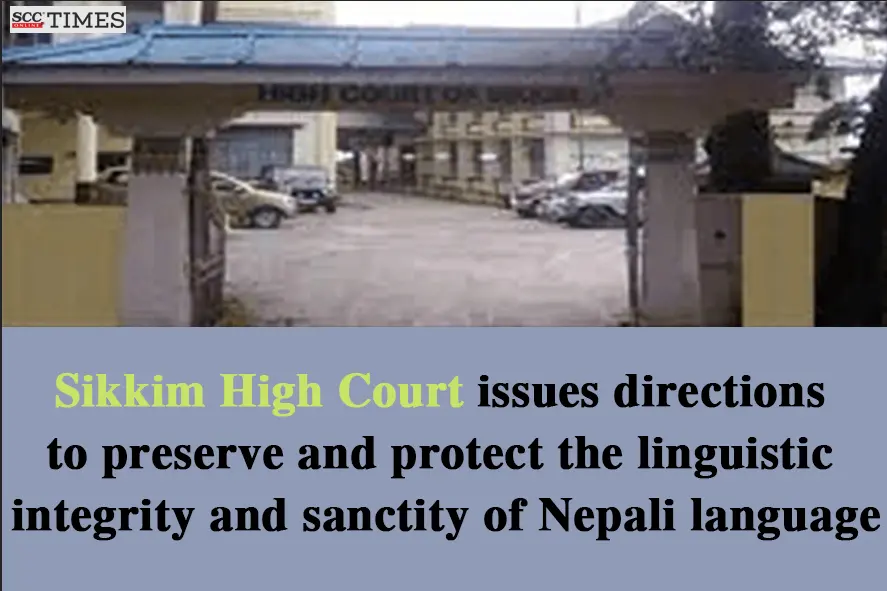Sikkim High Court: In the present case, a public interest litigation (‘PIL’) was filed by a retired Government graduate teacher in the Nepali language (‘petitioner’), for seeking urgent and effective judicial intervention to safeguard the linguistic integrity, constitutional sanctity and academic accuracy of the Nepali language, as it was being taught and propagated within the State of Sikkim by the Sikkim University (“Respondent 1’). The Division Bench of Biswanath Somadder, CJ*., and Meenakshi Madan Rai, J., found the petitioner’s grievance bona fide and held that even if educational institutions made minor distortions while imparting Nepali language, such distortions could compromise with the linguistic integrity and academic accuracy of the language and could also cause a direct impact on the delicate distinction between the Nepali language and other languages where the script was common. Accordingly, the Court disposed of the PIL and formulated directions to preserve and protect the linguistic integrity and sanctity of the Nepali language.
The State of Sikkim (‘Respondent 3’) had constituted a Linguistic Oversight Expert Committee (‘Linguistic Committe’) comprising of eminent language experts and distinguished scholars with demonstrable expertise in Nepali linguistics, phonetics/phonology, pedagogy and curriculum design and pursuant to this Court’s last order, the Linguistic Committe had filed a detailed report.
The report stated that, “After the deliberation, the Committee strongly recommends reinstating the Nepali Consonants (sic) ण, श, ष, ड़, ढ़, क्ष, त्र, ज्ञ as prayed by the petitioner, which is logical and important for the conservation and preservation of Nepali Alphabets for future posterity.” and thus, the Court opined that the petitioner’s grievances were bona fide and there was an imperative necessity to preserve and protect the linguistic integrity and sanctity of the Nepali language which almost everyone in Sikkim spoke.
Further, the Court specified that even if there were minor distortions noticed while an educational institution imparted through its teachings the Nepali language, such distortions would compromise with the linguistic integrity and academic accuracy of the language and could also cause a direct impact on the delicate distinction between the Nepali language and other languages where the script was common, namely, the Devanagari script.
Further, the said report prayed for continued monitoring of the usage of Nepali language in different domains; such as, universities, colleges, schools for teaching learning process along with publications made by publication houses as also media, both print and social. The Court found substance in it and accepted the same.
Accordingly, the Court disposed of the PIL and gave the following directions:
-
Respondent 1 should take immediate steps to act on the recommendation of the Linguistic Committee to reinstate the Nepali consonants “ण, श, ष, ड़, ढ़, क्ष, त्र, ज्ञ”, being logical and important for the conservation and preservation of Nepali alphabets for future posterity. For this purpose, Respondent 1 should direct the authors of the books in question to issue necessary corrigendum forthwith. Upon failure on the authors’ part, Respondent 1 should not allow the books concerned to be part of its curriculum.
-
After complying, Respondent 1 should inform the Linguistic Committee regarding the compliance.
-
The Linguistic Committee should continue monitoring the usage of Nepali language in different domains; such as, universities, colleges, schools for teaching learning process along with publications made by publication houses as also media, both print and social.
-
Respondent 3 should provide full support and cooperation to the “Linguistic Oversight Expert Committee” for the purposes as stated hereinabove.
[Dhan Raj Gurung v. Sikkim University, 2025 SCC OnLine Sikk 105, decided on 24-9-2025]
*Judgement authored by Chief Justice Biswanath Somadder
Advocates who appeared in this case:
For the Petitioner: Kazi Sangay Thupden, Mr. O.P. Bhandari, Sajal Sharma, Prerana Rai, Srijana Bagdas, Gyaltsen Barfungpa, Advocates
For the Respondents: Bhusan Nepal, Advocate, Sangita Pradhan, Deputy Solicitor General of India, Sittal Balmiki, Natasha Pradhan, Advocates, Zangpo Sherpa, Additional Advocate General and Sujan Sunwar, Assistant Government Advocate


